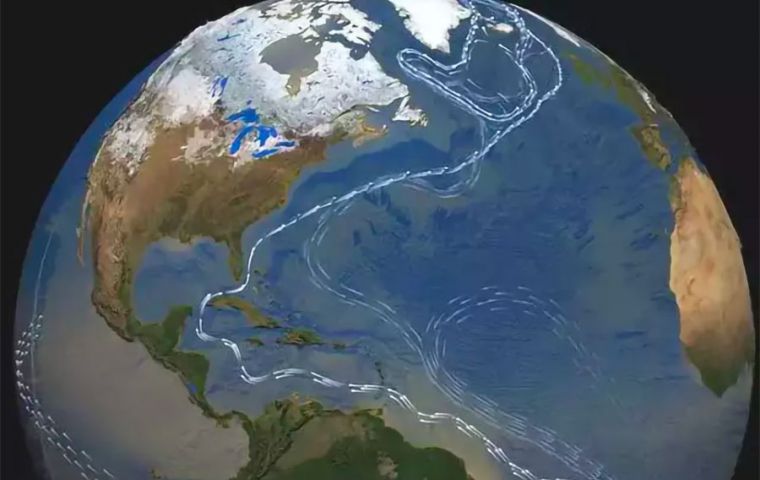MercoPress. South Atlantic News Agency
Atlantic Ocean: AMOC to collapse by mid-century?
 If this collapse occurs, the effects on the climate will be far-reaching
If this collapse occurs, the effects on the climate will be far-reaching According to a study published in the journal Nature Communications, the Atlantic Meridional Overturning Circulation (AMOC), a major ocean current system that transports warm water from the tropics to the northern Atlantic, could collapse by mid-century if greenhouse gas emissions do not cease.
The research estimated that the AMOC “will collapse, with 95% certainty, between 2025 and 2095. This will most likely occur in 34 years, in 2057,” which will significantly increase warming in the tropics and increase storms in the North Atlantic.
Professor Peter Ditlevsen explained: “Closing the AMOC may have very serious consequences for the Earth's climate, for example, by changing the way heat and precipitation are distributed globally. While the cooling of Europe may appear less severe as the world gets warmer and heat waves occur more frequently, this closure will contribute to further warming of the tropics, where rising temperatures have already resulted in challenging living conditions.”
“Our result underscores the importance of reducing global greenhouse gas emissions as soon as possible,” said the researcher.
The melting of the Greenland ice sheet is in the crosshairs of many scientists, as the melt is bringing large amounts of freshwater into the North Atlantic, which could be altering the balance of heat and salinity that maintains the movement of the AMOC. Part of the Atlantic, south of Greenland, has cooled considerably in recent years, which some scientists believe is a sign that the system is slowing down.
Georgia Tech physical oceanographer Susan Lozier pointed out that “It is extremely difficult to look at a brief record of ocean inversion and say what will happen in 30, 40 or 50 years.”
Sea surface temperatures in the North Atlantic near Greenland were not necessarily influenced by changes in overturning, but much of the problem could be explained by changes in atmospheric and wind patterns, she added.
If this collapse occurs, the effects on the climate will be far-reaching. Much of the northern hemisphere is expected to cool, while the coasts of North America and Europe could experience more rapid sea level rise. Northern Europe could face stormier winters, while the Sahel in Africa and the monsoon regions of Asia are likely to receive less rain.
Ocean currents are water currents that flow continuously in the oceans, transporting large amounts of water and heat around the world. These currents, fundamental to the global climate, play a crucial role in heat distribution and climate regulation in different regions of the planet.
Its formation is due to several factors, the main ones being wind action, the Earth's rotation (Coriolis effect), water temperature and salinity, and underwater topography.




Top Comments
Disclaimer & comment rules-

-

Read all commentsBrasileiro
Jul 27th, 2023 - 08:59 pm +1Another scare tactic from the “experts”...
¡Saludos!
I've always said that. Glaciations always happen when there is an interruption of the Gulf Stream that originates in warm waters off the Brazilian coast.
Jul 27th, 2023 - 02:50 pm -1When the Gulf Stream is interrupted, the North of the planet freezes.
Volcanoes have always been glacial inducers. Nowadays we have the stubbornness of human beings.
Dinosaurs managed to dominate the planet for over 100 million years. Humans have been here for less than 200,000 years.
Who is smarter?
https://www.youtube.com/watch?v=HKg-JqTP7Hk
Commenting for this story is now closed.
If you have a Facebook account, become a fan and comment on our Facebook Page!